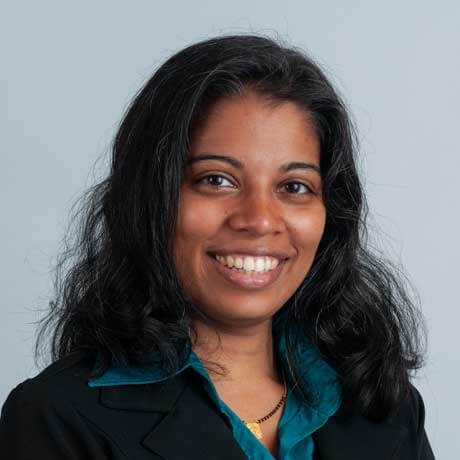Sonali Palchaudhuri, A.B. ‘07
In deciding the course of treatment for the patient, doctors must recognize that every case is unique. A test that might prove critical to improving the health of one patient might be unnecessary, or even harmful, to another. Our health care system wastes hundreds of billions of dollars each year on excessive testing, prescriptions, and procedures.
Sonali Palchaudhuri, A.B. ‘07, a gastroenterologist at Massachusetts General Hospital, knows that reducing that waste will not only lower hospital spending, but also improve patient outcomes and quality of life. This approach to what she calls “high-value care” has guided her professional career since graduating from the Harvard John A. Paulson School of Engineering and Applied Sciences (SEAS), which has included earning a medical degree and serving as national director for the Providers for Responsible Ordering, an organization focused on encouraging high-value care among front-line providers.
“Here in America, we seem to think that we have the resources to afford everything in every scenario, which has translated to thinking that if we have the money to buy more and do more, we should,” Palchaudhuri said. “This philosophy really undercuts the other costs to care, such as the risks and harms of certain procedures and medications, and overlooks the fact that we in fact cannot afford everything.”
Late-night conversations and percussion brought Palchaudhuri to Harvard from Ramapo High School in New York. A multi-instrument musician who at one point considered studying ethnomusicology, she discovered The Harvard Undergraduate Drummers group during a campus visit, and during that trip stayed over with a friend living in Wigglesworth Hall.
“She and her suitemates were up all night talking about the difference between psychology and sociology,” Palchaudhuri said. “It was just one of those late-night college conversations that I hadn’t had before, and I really enjoyed the breadth of experiences that people brought to Harvard, their very different mindsets and opinions. That’s when I really fell in love with the discourse that I’d seen at Harvard, of people chatting and challenging each other.”
Palchaudhuri studied biomedical engineering at SEAS, combining her passions for engineering and medicine. Engineering allowed her to build and innovate, something she’d loved to do even at a young age, while medicine offered more direct interpersonal interaction.
“I grew up fixing things around the house, building things with my dad, and getting to use a lot of tools in our garage,” she said. “I recently found this paper at my parents’ house from when I was eight that asked what I’d wanted to be, and I’d cut the space in half and wrote ‘scientist’ on one side and ‘doctor’ on the other.”
Biomedical engineering allowed Palchaudhuri two potential career paths: an M.D., or a Ph.D. in an engineering field. Before making that choice, she spent a year traveling the world to explore music and spirituality.
“I was really into the idea of music therapy,” she said. “I spent time in Korea, India, China, a little bit in Senegal, just talking to imams and spiritual leaders, chasing shamans up mountains, while writing articles about energy.”
Through that trip, Palchaudhuri realized she wanted to apply her knowledge directly to patients. That led her to medical school at the University of Michigan, though it wasn’t long before she took another gap year to travel, this time to volunteer in health centers in Malawi.
“I became very interested in global health,” she said. “Not just addressing health problems, but figuring out how to address them in developing areas, where innovation actually seems to play a larger role. That for me was a pivotal year in experiencing the kinds of innovation needed to change how we care for patients. It was then that I realized my passion for the implementation and quality improvement side of things, where you’re making sure that ideas translate to direct patient care.”
Palchaudhuri returned to complete her M.D. in 2013 and within a year became involved with Providers for Responsible Ordering, which promotes high-value care through the elimination of excessive testing and procedures. She also received a certificate in Quality, Patient Safety and Outcomes Research at Johns Hopkins University, where she did a four-year residency. She joined Mass. General as a gastroenterologist in 2021.
“Gastroenterology is an area that actually still has an important footprint in terms of global health problems, and there are a lot of opportunities for improvement,” she said. “I’m very happy where I am. I’m looking forward to having a role where I can guide what kinds of projects we do and address some of the issues we have with patient care.”
Palchaudhuri also has certification in the Lean Six Sigma waste reduction method from Villanova University, which is signified with a martial arts-style black belt, and a master’s degree in Health Care Innovation from the University of Pennsylvania School of Medicine. In the coming years, she is hoping to take a broader role in quality innovation at Mass. General, which would let her focus on innovation and responsible medicine, a mindset she developed through both her medical training and engineering studies at SEAS.
“The concepts of efficiency and optimization – part of the bedrock for high value care – come from being an engineer,” she said. “Problem solving usually requires the same technique: identify the problem, understand the boundary conditions, determine potential solutions, implement and check to see what works. That’s in engineering, medicine, implementation, innovation work; it’s just that the vocabulary is a little different.”
Press Contact
Matt Goisman | mgoisman@g.harvard.edu
